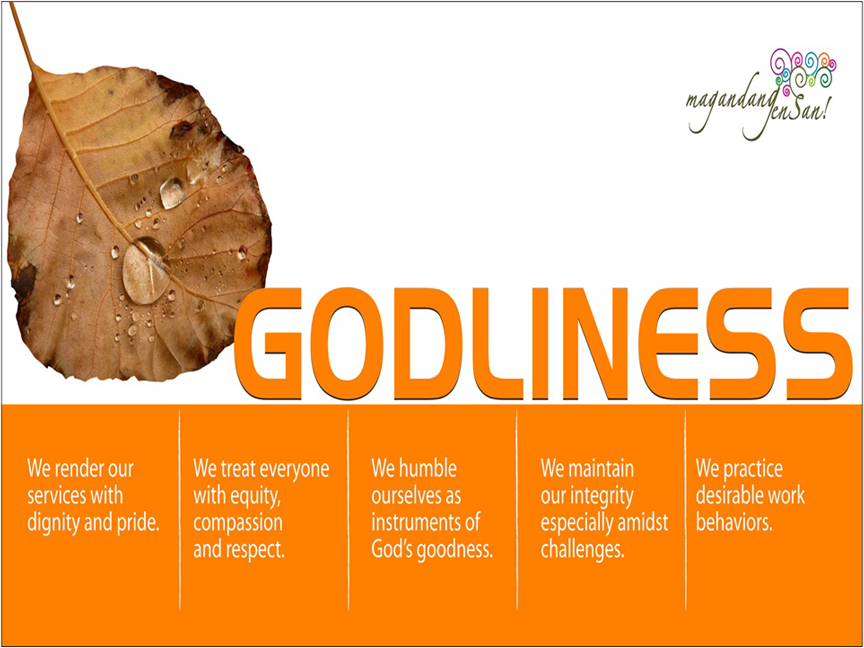hr mechanisms
HUMAN RESOURCE MERIT PROMOTION SELECTION BOARD (HRMPSB)
Executive Order No. 024, series of 2010 provides the composition of PSB as follows:
Section 1. COMPOSITION of the Personnel Selection and Promotion Board of the City Government of General Santos:
Chairperson:
City Mayor or his/her designated representative
Members:
Department Head where vacancy exists
HRMDO Head
President of Employees Association
Representative of the First Level, where selection of an applicant for first level vacancy is concerned
Representative of the Second Level, where selection of an applicant for second level vacancy is concerned
Chairperson of SP – Committee on Rules
CSC MC No. 4, series 2005 provides that: The PSB shall assist the appointing authority in the judicious and objective selection of candidates for appointment in the agency in accordance with the approved Agency Merit Selection
PERFORMANCE MANAGEMENT TEAM (PMT)
Section 2, Executive Order No. 037, series of 2012 Section 3, Executive Order No. 037, series of 2012
Section 2. COMPOSITION. The Performance Management Team shall be composed of the following:
Chairperson:
To be designated by the City Mayor
Members:
Head of Human Resource Management and Development Office
City Planning and Development Coordinator
City Budget Officer
GSCGEA President or authorized alternate representative
Section 3, Executive Order No. 037, series of 2012
Section 3. FUNCTIONS AND RESPONSIBILITIES. The PMT shall perform the following functions:
- Sets consultation meeting of Heads of Departments for the purpose of discussing the targets set in the
office performance commitment and rating form - Ensures that office performance targets and measures, as well as the budget are aligned with those of the
agency and that work distribution of offices/unit is rationalized. - Recommends approval of the office performance commitment and rating to the Head of Agency.
- Acts as appeals body and final arbiter for performance
management issues of the agency - Identifies potential top performers and provides inputs to the PRAISE
Committee for grant of awards and incentives - Adopts its own internal rules, procedures and strategies in carrying out the above responsibilities including schedule of meetings and deliberations, and delegation of authority to representatives in case of absence of its members.
- Initiates the implementation of the SPMS as provided under CSC MC No.6 s2012 and CSC Resolution 1200481 promulgated on March 16, 2012 and providing the guidelines in the establishment and implementation of Agency Strategic Performance Management System (SPMS)
HR DEVELOPMENT COUNCIL (HRDC)
EXECUTIVE ORDER NO. 14 SERIES OF 2017, AN EXECUTIVE ORDER RENAMING THE PERSONNEL DEVELOPMENT COUNCIL (PDC) TO HUMAN RESOURCE DEVELOPMENT COUNCIL (HRDC), OUTLINING ITS COMPOSITION, DEFINING ITS FUNCTIONS AND PROVIDING FOR THE MECHANICS OF IMPLEMENTATION.
Section 1.
CREATION. The Personnel Development Council (PDC) is hereby renamed to Human Resource Development Council (HRDC) and constituted.
Section 2.
COMPOSITION. The HRDC shall be composed of the following:
Chairperson:
City Administrator’s Office (CAdmin);
Members:
Human Resource Management & Development Office
(HRMDO);
City Planning and Development Office (CPDO);
Chairperson, SP – Committee on Education; and
President, General Santos City Government Employees Association (GSCGEA).
Section 3.
FUNCTIONS AND RESPONSIBILITIES. The HRDC shall have the following functions and responsibilities:
- Develop and recommend policies and implement TMS in the LGU;
- Recommend a Strategic Training Plan (STP) for the LGU;
- Review and recommend to the City Mayor annual training plans and budget;
- Develop agency guidelines for the selection of agency nominees for training,
conventions, conferences, seminars and scholarship programs; - Recommend measures that would ensure that all training courses funded by
the LGU be based on the identified training needs of the agency using available
data and tools such as the Training Needs Assessment (TNA) and Competency
Mapping through Management Development Questionnaire (MDQ); - Recommend the training monitoring and evaluation system policies;
- Monitor proper advertisement/dissemination of available training or scholarship
opportunities by HRMDO; - Establish policies for the use of training resources; and
- Ensure linkages between and among departments to maximize training
resources.
ADMINISTRATIVE BOARD
With the new procedure under Revised Rules on Administrative Cases in the Civil Service, and a new composition proposed by the City Legal Office, under Executive Order No. 037-A, series of 2014, the Administrative Board shall be composed as follows:
Section 1. (Rule VIII) COMPOSITION.
The General Santos City Administrative Board shall be composed of the following:
Administrative Board I
Presiding Officer shall be designated by the City Mayor
Members:
City Government Department Head of the Department where the Respondent belongs
HRMDO Head
Union Representative (1st level or 2nd level)
Administrative Board II
Presiding Officer shall be designated by the City Mayor
Members:
City Government Department Head of the Department where the Respondent belongs
HRMDO Head
Union Representative (1st level or 2nd level)
Administrative Board III
Presiding Officer shall be designated by the City Vice Mayor
Members:
Division Chief of the Sangguniang Panlungsod Office where the respondent belongs
Representative from the Vice Mayor’s Office
HRMDO Head
Union Representative (1st level or 2nd level)
Section 2. Rule VIII of Executive Order No.036, series of 2014 provides for the POWERS AND FUNCTIONS of the Administrative Board:
Assists the disciplining authority in the formulation of administrative policies and
procedures necessary for the development of a more effective and efficient administration of the City Government;
Assists in the evaluation and settlement of salient administrative concerns confronting the disciplining authority;
Conducts continuously assessment, evaluation and monitoring of the implementation of administrative policies and procedures thereby recommending improvements for the approval of the disciplining authority;
Formulates policies, procedures, systems, and rules and regulations that the Board may deem necessary for it to function as expected subject to the approval of the disciplining authority;
Hears and studies administrative cases i.e. complaints for or against any employee that may be endorsed by the disciplining authority;
Does other related functions as may be directed by the disciplining authority for the improvement of the administrative system of the city government.
ADMINISTRATIVE BOARD FOR PUBLIC HEALTH WORKERS (ABPHW)
Executive Order No. 038, series of 2014 provides for the composition and f unctions of ABPHW as follows:
Section 1. COMPOSITION. The General Santos City Administrative Investigation
Committee for Public Health Workers shall be composed of the following:
Chairperson:
City Health Officer / Chief of Hospital
Members:
Supervisor of the Public Health Worker under investigation
Representative of the Public Health Workers’ Organization (if any)
1st Level Representative
2nd Level Representative
HRMDO Department Head
Hearing Officer to be designated by the City Mayor
If the chairperson is a party to a case, the City Mayor shall designate/appoint a
temporary chairperson to hear such case
Section 2. POWERS and FUNCTIONS.- The Administrative Board shall have the
following power and functions:
Assists the disciplining authority in the formulation of administrative policies and procedures necessary for the development of a more effective and efficient administration of the city government;
Assists in the evaluation and settlement of salient administrative concerns
confronting the disciplining authority;
Conducts continuously assessment, evaluation and monitoring of the implementation of administrative policies and procedures thereby recommending improvements for the approval of the disciplining authority;
Formulates policies, procedures, systems, and rules and regulations that the Board may deem necessary for it to function as expected, subject to the approval of the disciplining authority;
Hears and studies administrative cases i.e. complaints for or against any employee that may be endorsed by the disciplining authority;
Do other related functions as may be directed by the disciplining authority for the improvement of the administrative system of the city government.
GRIEVANCE COMMITTEE
Section 6., Executive Order No. 002, series of 2002
Composition. The City Grievance Committee shall be composed of:
The City Mayor or his/her duly designated representative who will act as Chairperson;
The Department Head of the department where grievance was elevated by concerned and affected employee.
Two (2) representatives named by the Employees Association who shall serve for a term of two (2) years, one from the first level and another from the second level
The Bilis Aksyon Partner (BAP) duly designated.
Section 6, Executive Order No. 002, series of 2002
Responsibilities:
Establish its own internal procedures and strategies.
Membership in the grievance committee shall be considered part of the members’ regular duties;
Develop and implement pro-active measures or activities to prevent grievance such as employee assembly, which shall be conducted at least once every quarter, “talakayan”, counseling and other HRD interventions.
Minutes of the proceedings of these activities shall be documented for audit purposes;
The HRMDO, in collaboration with the agency grievance committee, shall conduct a continuing information drive on grievance machinery among its officials and employees. It shall also extend secretariat services to the grievance committee;
Conduct dialogue between and among the parties involved;
Direct the documentation of the grievance including the preparation and signing of written agreements reached by the parties involved;
Issue Certification on the Final Action on the Grievance (CFAG) which shall contain, among other things, the following information: history and final action taken by the agency on the grievance,
and;
Submit a quarterly report of its accomplishments and status of unresolved grievances to the Civil Service Regional Office concerned.
COMMITTEE ON DECORUM AND INVESTIGATION (CODI)
Section 1, Executive Order No. 028, series of 2012
Section 1. FACT-FINDING COMMITTEE:
CREATION AND COMPOSITION
A Committee On Decorum and Investigation (CODI) shall be created in the City Government of General Santos and shall be composed of the following:
One (1) representative from the management level;
One (1) representative from the accredited union of the Local Government Unit;
One (1) representative from the second (2nd) level employees (supervisor level);
One (1) representative from the first (1st) level employees;
One (1) representative from the GAD Committee
Program of Awards and Incentives for Service Excellence (PRAISE) Committee
Executive Order No. 004, series of 2011 provides for the composition and functions of the PRAISE Committee:
Section 1.
COMPOSITION. The CityGovernment PRAISE is hereby re-organized
and shall be composed of:
Chairperson:
City Mayor
Alternate Chairperson:
Executive Assistant to the City Mayor
Members:
HRMDO Officer
City Planning and Development Coordinator
City Budget Officer
Three (3) Union Representatives
Three (3) Private Sector Representatives
Section 2. RESPONSIBILITIES
The PRAISE Committee shall be responsible for the development, administration, monitoring and evaluation of the awards and incentives system of the City Government. It shall meet periodically to do the following:
- Establishes a system of incentives and awards to recognize and motivate employees for their performance and conduct;
- Formulates, adopts and amends internal rules, policies and procedures to govern the conduct of its activities which shall include the guidelines in evaluating the nominees and the mechanism for recognizing the awardees;
- Determines the forms of awards and incentives to be granted;
Monitors implementation of approved suggestions and ideas through feedback and reports; - Develops, produces, and distributes a system policy manual and orients the employees on the same;
- Documents best practices, innovative ideas and success stories which will serve as promotional materials to sustain interest and enthusiasm;
Submits an annual report on the awards and incentives systems to the CSC on or before the thirtieth day of January; - Monitors and evaluates the system’s implementation every year and make essential improvements to ensure its suitability to the agency; and,
Addresses issues relative to awards and incentives within fifteen days from the date of submission.
OCCUPATIONAL SAFETY AND HEALTH COMMITTEE (OSH)
Executive Order No. 055, series of 2014 provides for the composition and functions of OSH Committee as follows:
Section 6. COMPOSITION. The General Santos City Administrative Investigation Committee for Public Health Workers shall be composed of the following:
Chairperson:
City Mayor/Alternate
Members:
HRMDO Department Head
City Budget Officer
GSCFHSD Assistant Department Head
GSCHSD Assistant Chief of Hospital
OBO Department Head
GSCGEA Officer
Section 7. FUNCTIONS of OSH Committee, Secretariat, and Department Safety Officers. The Committee shall:
- Fosters cooperation and consultation between management and employees in
identifying, evaluating and controlling hazards at workplaces; - Formulates policies/guidelines on Occupational Safety and Health for approval of the City Mayor;
Conducts meetings; - Oversees implementation of the policy and investigate any matter at the workplace that is considered not safe or is a risk to safety and health of employees;
- Submits summary reports on incidence/occurrence investigation and inspections;
- Performs analysis of occupational accidents and occupational diseases;
- Facilitates conduct of surveillance of employees’ health in relation to work;
- Identifies and assesses risks from health hazards in the workplace;
Conducts surveillance of work environment factors and practices which may affect employees’ health; - Facilitates organization of first-aid and emergency treatment;
- Collaborates in providing information, education and training in the fields of occupational health and hygiene and ergonomics; and,
- Develops programs for the improvement of workplaces and work practices.






